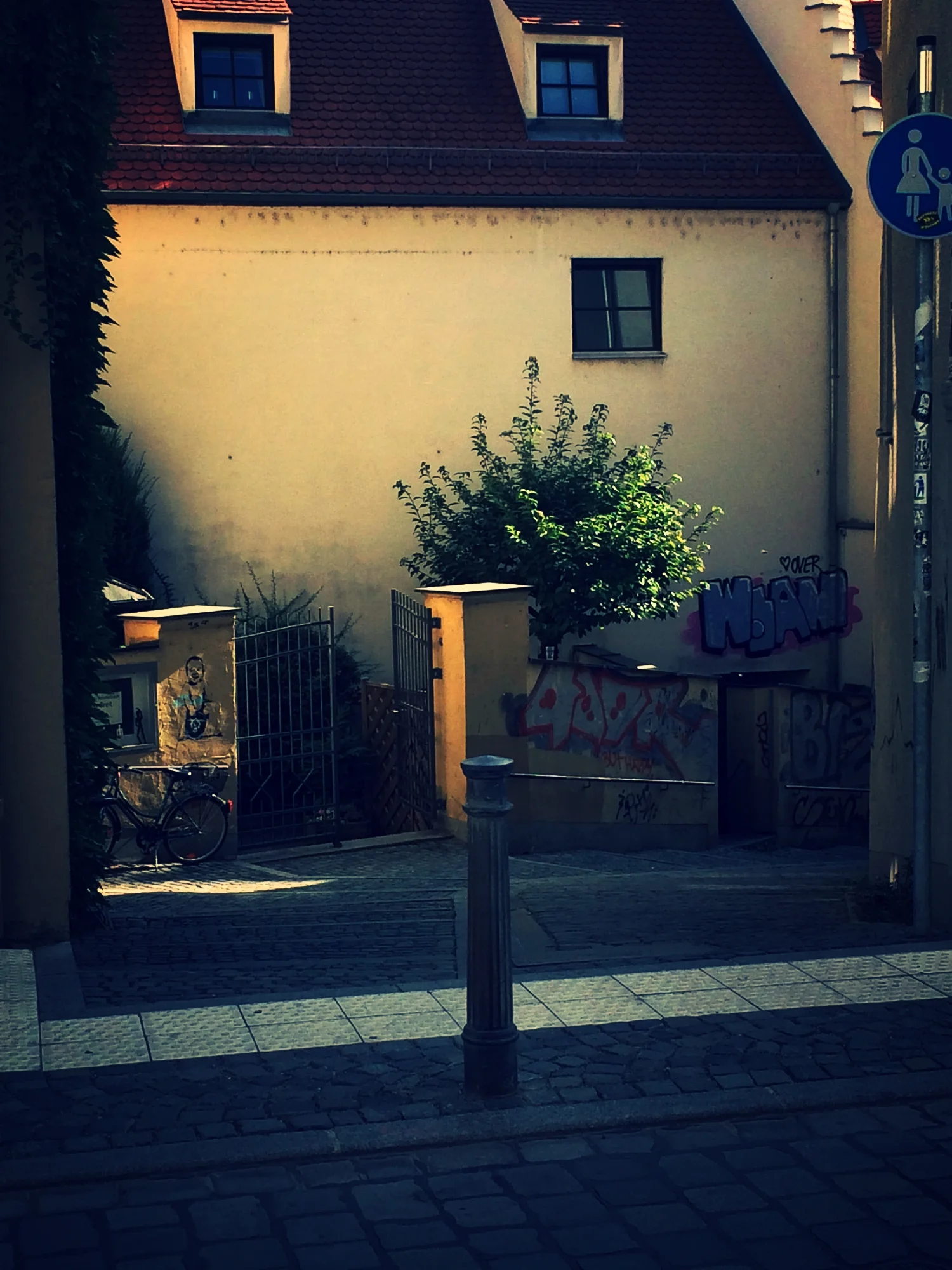The Small Differences
Sometimes I forget I live in Germany. This may seem odd but it happens at least once a month. When I first came here, I’d be constantly reminded that I was living in a different country. Large differences were all around me, such as speaking German or driving on the other side of the road, I would be on constant alert for these differences, or anticipating possible intercultural blunders. Nowadays these things are all quite normal, which has made me far too relaxed; I frequently revert to autopilot mentally when I’m out and about, which can lead to some embarrassing situations. For instance, more than once I've walked into a shop and instinctively spoken in English, which is generally not the worst mistake in Germany, but it can create confusion and make a person feel a bit daft. Interestingly, as the big differences became less important, I’ve found that the small differences are far better to orientate myself by. A family in matching Jack Wolfskin jackets, a local bakery, or walking passed a shop selling Trachten are more obvious symbols of my life in Germany. Having to spend so much time in the house over the last two years only made the situation worse. I’m sure I’m not alone in feeling like I’ve been living in my own pocket universe, solely inhabited by a few regular contacts with the outside world. Even so, I managed to find numerous small differences around my house to remind me that I’m not in Kansas anymore.
Light Switches
I’ve never understood why German homes have bigger light switches. To be honest, I find it a little unnerving. I'm sure there is a logical, boring answer to this perplexing issue. Perhaps Germans on average have bigger hands, I can't say that I've noticed. In comparison to UK or US light switches, the German variety are massive, but, unsurprisingly , they are also very useful. As the designated carrier of all heavy objects in my household, I find myself carrying unwieldy items at all times of the day and night. Thanks to the oversized switches, turning on the lights in the dark or when my hands are full is a simple matter of mashing an elbow, shoulder, or a well-aimed foot at the wall. Nine times out of ten, whatever part of my body I’m flailing connects with the light switch. Try that in in Britain and you’re liable to puncture a hole through the plaster board.
German Taps
If you ever meet a German travelling in the UK, invite them to your home, then take the opportunity to show them your taps and watch for the grimace of disgust. Britain has steadfastly ignored many of mainland Europe’s innovations, but easily the most heinous snub has been not having mixer taps as standard. Although things are changing, many British homes still have two taps for cold or hot water. Children are educated to perform a swishing action between the two temperatures or to turn both on and fill the basin. In Germany they have one tap, allowing you to select the perfect temperature before soaping up and getting down to business. Although I’m now a full mixer tap convert, I’m still impressed with the level of annoyance two taps produces in Germans.
German House Tree
In Germany pot plants are for the weak willed, what you want is a tree. A big tree. In your living room. Obviously having some plants is hardly a tremendous cultural shift, but the quantity and prevalence of house trees and large pot plants feels unusual. Many homes resemble a mix of bohemian paradise and Kew Gardens. Some people I know have dedicated whole sections of their homes to large plants and trees, going beyond the bohemian look and creating a savage lands vibe. The plants don’t just stay at home. Many offices in Germany have similar trees and giant pot plants slowly taking over the office, requiring people to use a machete to get to the photocopier. The sheer exposure to these indoor woodlands has had an effect though. I realised recently I had gained a new level of integration when my wife asked how I might decorate my new office and I replied “Dunno, some pictures and I guess a couple of plants would be nice”. My wife and I are still recovering from the shock.
Coffee Filter
Coffee is officially a German blood type, I checked and that is a true fact. It’s so important, many Germans have a coffee machine of some description in their homes, and more than once I’ve been stuck talking to someone who can’t stop gushing about their expensive coffee maker. However, most German homes will always have a backup, after all, this is the land of organisation. Should the coffee machine stop working, most Germans have a plastic coffee filter too. British homes, in comparison, will have a cafetiere or simply opt for instant coffee. I’m fairly sure that it’s against the law to offer guests in Germany instant coffee. I’ve never tried though, I like living here too much. The plastic coffee filter is ubiquitous and like the British and their travel kettles, the German traveler usually has one with them. I don’t want to brag, but we currently have four in our cupboards somewhere, not because we’re fancy, but because of the horrific memories of that summer holiday when we forgot to bring one. Maybe we’re overcompensating, but at least we’ll be fully caffeinated.
Window Shutter
Curtains can really pull a room together, or at least that's what the home furnishing magazines I read in the dentist's waiting room say. However, ask yourself this; can a nice set of curtains protect you from the inevitable zombie apocalypse? No, they can't! What you need is some heavy-duty metal shutters that can quickly transform a stylish home into an armoured, Zombie proof death fortress. Keeping out the undead is only one practical aspect of window shutters, the other is the ability to keep a bedroom in toe-stubbing blackout. Honestly, the only time I’ve ever experienced this level of darkness was when we visited a disused coal mine a few years ago and they gave us all PTSD by shutting off the lights part way through. Zombie proofing darkness is obviously useful, but Rollladen really come into their own in the summer. US citizens in Germany often complain of a lack of air conditioning systems, but who needs one when simply lowering the shutters can easily cool a room. When the zombie hordes do finally come, Germany will at least face them well-rested and at a reasonable room temperature.
Gefro Knives
If you’re lucky enough to be invited to the home of a Bavarian, politely excuse yourself for a moment and have a quick rummage through their cutlery drawer. I guarantee you will find at least one of these red handled knives. What you have discovered is the Gefro knife, possibly the sharpest object known to man. The serrated edge can make short work of the thickest loaf of bread, most hardy vegetables and any errant fingers. The Gefro knife is usually given away as a free gift by the Gefro mail order soup and sauce company with orders over a certain price. Sometimes they just come in the mail, meaning any letter from Gefro should be opened very carefully.
The Windows
Most new arrivals will at some point mention German windows. It might be a strange topic to bring up, but these humble windows are a marvel of engineering. Don’t take my word for it though, just ask Angela Merkel. When asked about what Germany meant to her, Merkel cited air-tight windows. This might sound a bit weird to those who don’t live in Germany, but once introduced to them, most non-Germans will spend several hours simply opening and closing them, only stopping to declare to anyone else in the room “Look at that action!”. German windows are not only very secure, they open in two different ways. This is particularly important in a country that reveres the health benefits of “Frische luft” while simultaneously demonising it as the harbinger of all illness. This ensures that Germans can both enjoy a cool breeze, while also complaining about the cool breeze. It’s a win-win!
Image Credit
Photo by Anna Shvets from Pexels












